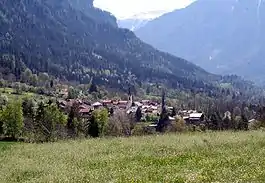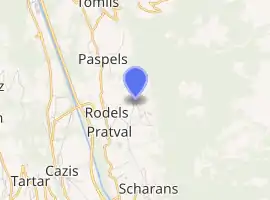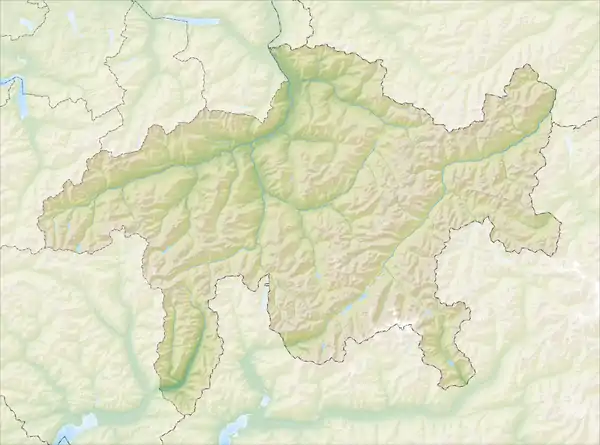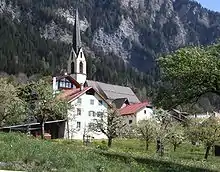Almens
Almens (Romansh: Almen) is a former municipality in the district of Hinterrhein in the Swiss canton of Graubünden. On 1 January 2015 the former municipalities of Almens, Paspels, Pratval, Rodels and Tomils merged to form the new municipality of Domleschg.[1]
Almens | |
|---|---|
 | |
 Coat of arms | |
Location of Almens 
| |
 Almens  Almens | |
| Coordinates: 46°44′N 9°27′E | |
| Country | Switzerland |
| Canton | Graubünden |
| District | Hinterrhein |
| Government | |
| • Mayor | Andreas Wespi |
| Area | |
| • Total | 8.34 km2 (3.22 sq mi) |
| Elevation | 787 m (2,582 ft) |
| Population (Dec 2013) | |
| • Total | 228 |
| • Density | 27/km2 (71/sq mi) |
| Time zone | UTC+01:00 (Central European Time) |
| • Summer (DST) | UTC+02:00 (Central European Summer Time) |
| Postal code(s) | 7416 |
| SFOS number | 3631 |
| Surrounded by | Churwalden, Fürstenau, Paspels, Pratval, Rodels, Scharans, Trans, Vaz/Obervaz |
| Website | www SFSO statistics |
History
Almens is first mentioned in the first half of the 9th Century as de Lemenne.[2]
Geography

Before the merger, Almens had a total area of 8.4 km2 (3.2 sq mi).[3] Of this area, 33.9% is used for agricultural purposes, while 45.5% is forested. Of the rest of the land, 1.7% is settled (buildings or roads) and the remainder (19%) is non-productive (rivers, glaciers or mountains).[3]
The former municipality is located in the Domleschg sub-district of the Hinterrhein district. It is located on a high terrace above the right bank of the Hinterrhein. It consists of the village of Almens and the hamlet of Mulegns.
Demographics
Almens had a population (as of 2013) of 228.[3] As of 2007, 1.4% of the population was made up of foreign nationals. Over the last 10 years the population has grown at a rate of 5.2%.[3]
As of 2000, the gender distribution of the population was 47.5% male and 52.5% female.[4] The age distribution, as of 2000, in Almens is; 25 people or 11.5% of the population are between 0 and 9 years old. 10 people or 4.6% are 10 to 14, and 15 people or 6.9% are 15 to 19. Of the adult population, 18 people or 8.3% of the population are between 20 and 29 years old. 34 people or 15.7% are 30 to 39, 42 people or 19.4% are 40 to 49, and 31 people or 14.3% are 50 to 59. The senior population distribution is 10 people or 4.6% of the population are between 60 and 69 years old, 18 people or 8.3% are 70 to 79, there are 12 people or 5.5% who are 80 to 89, and there are 2 people or 0.9% who are 90 to 99.[5]
In the 2007 federal election the most popular party was the SPS which received 38.8% of the vote. The next three most popular parties were the SVP (26.5%), the FDP (23%) and the CVP (9.5%).[3]
In Almens about 76.1% of the population (between age 25-64) have completed either non-mandatory upper secondary education or additional higher education (either university or a Fachhochschule).[3]
Almens has an unemployment rate of 0.33%. As of 2005, there were 15 people employed in the primary economic sector and about 6 businesses involved in this sector. 1 person is employed in the secondary sector and there is 1 business in this sector. 11 people are employed in the tertiary sector, with 5 businesses in this sector.[3]
The historical population is given in the following table:[2][4]
| year | population |
|---|---|
| 1803 | 201 |
| 1850 | 226 |
| 1900 | 217 |
| 1950 | 252 |
| 1960 | 195 |
| 1970 | 133 |
| 1980 | 179 |
| 1990 | 200 |
| 2000 | 217 |
| 2010 | 215 |
Languages
Almens used to belong to the Romansh-speaking part of Graubünden, but today it is practically completely German-speaking. As of 2000, 95.9% of the population speaks German, with Romansh being second most common ( 2.8%) and Italian being third ( 0.5%).[6]
| Languages in Almens | ||||||
| Language | Census of 1980 | Census of 1990 | Census of 2000 | |||
| Number | Percentage | Number | Percentage | Number | Percentage | |
| German | 158 | 88.27% | 185 | 92.50% | 208 | 95.85% |
| Romansh | 18 | 10.06% | 10 | 5.00% | 6 | 2.76% |
| Italian | 3 | 1.68% | 0 | 0.00% | 1 | 0.46% |
| Population | 179 | 100% | 200 | 100% | 217 | 100% |
References
Notes
- Amtliches Gemeindeverzeichnis der Schweiz published by the Swiss Federal Statistical Office (in German) accessed 2 January 2013
- Almens in German, French and Italian in the online Historical Dictionary of Switzerland.
- Swiss Federal Statistical Office Archived 2016-01-05 at the Wayback Machine accessed 16 January 2015
- Graubunden in Numbers Archived 2009-09-24 at the Wayback Machine (in German) accessed 21 September 2009
- Graubunden Population Statistics Archived 2009-08-27 at the Wayback Machine (in German) accessed 21 September 2009
- Swiss Federal Statistical Office Archived 2016-01-05 at the Wayback Machine accessed 02-Oct-2009
| Wikimedia Commons has media related to Almens. |
External links
- Official Web site
- Almens in German, French and Italian in the online Historical Dictionary of Switzerland.